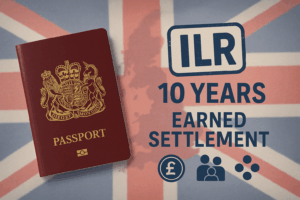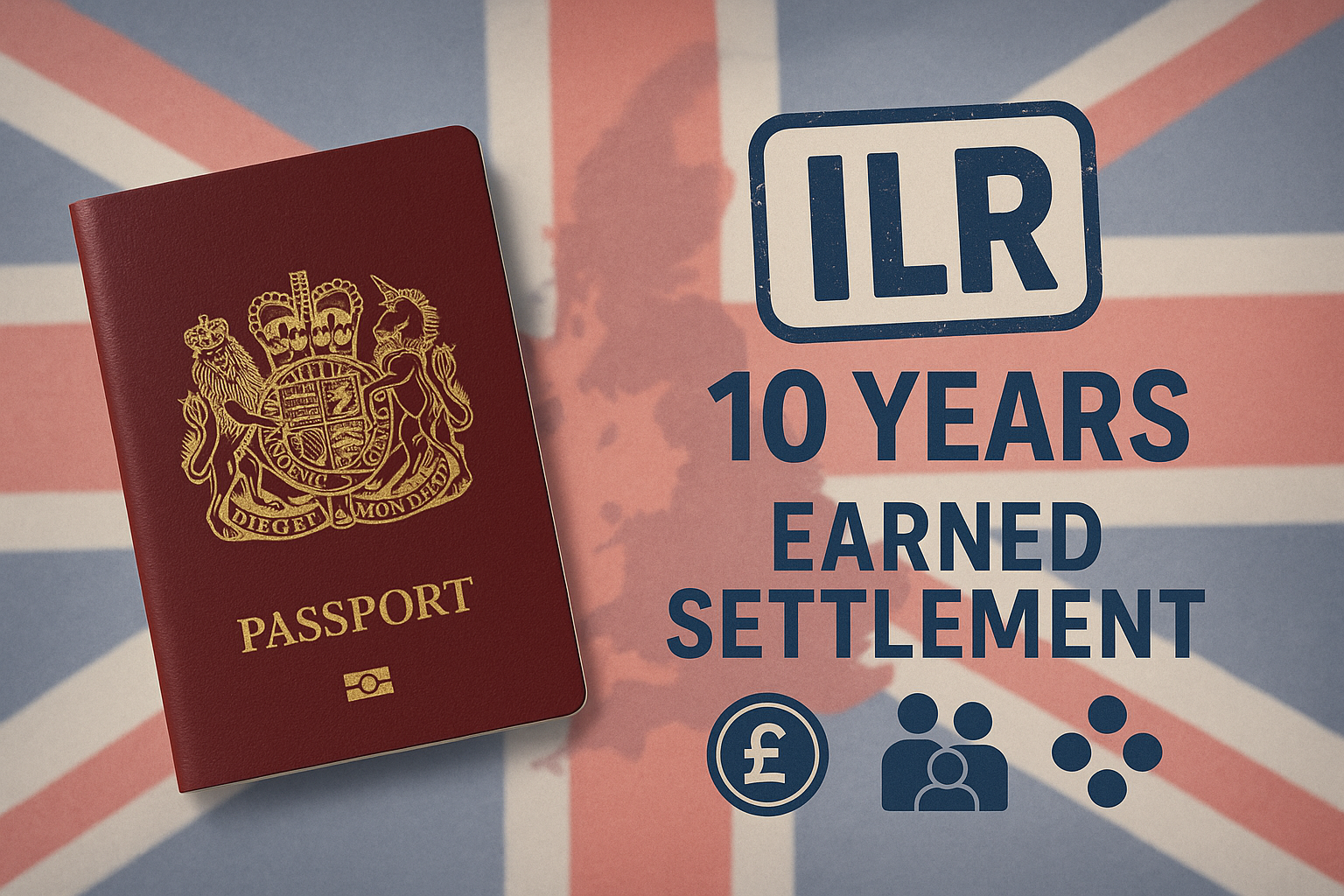UK ILR Changes 2025

Overview of UK ILR Changes 2025
The UK Government’s landmark white paper, “Restoring Control over the Immigration System,” was published on 12 May 2025. Among its most significant proposals are the UK ILR changes 2025, which aim to adjust how permanent residency is granted within the United Kingdom. Under these reforms, the traditional qualifying period for Indefinite Leave to Remain will be extended from five years to ten years for the vast majority of visa routes. In addition, the policy introduces an innovative “Earned Settlement” model that ties progression toward ILR to measurable contributions in areas such as employment, integration, and public service. Finally, settlement will be absorbed into a broader points-based framework, emphasizing a meritocratic system for awarding permanent residency. Together, these UK ILR changes 2025 are designed to reduce net migration numbers, reward long-term contributors, and tighten oversight of who gains the right to reside indefinitely in the UK.
Earned Settlement Model in UK ILR Changes 2025
One of the cornerstone reforms in the UK ILR changes 2025 is the shift from a purely time-based system to an “Earned Settlement” approach. This model requires applicants to accumulate points across various categories rather than simply waiting out a fixed period. The principal categories for earning points include:
Legal Residence and Continuous Employment
Under previous ILR rules, applicants accrued eligibility primarily through uninterrupted lawful residence (usually five continuous years). With the UK ILR changes 2025, legal residence remains a component but now carries a designated point value. For each complete year of lawful residency—provided there are no serious breaches of visa conditions—applicants earn a base number of points. In parallel, evidence of continuous employment, particularly in roles that meet or exceed specified salary thresholds, contributes additional points. This means that an individual working steadily in a skilled position for ten years could secure enough points, combined with residency, to qualify for ILR under the new system.
Evidence of Social Integration
A novel requirement in the UK ILR changes 2025 is that applicants must demonstrate active integration into British society. Voluntary community service, participation in recognized integration programs, and proven proficiency in English all yield points toward “Earned Settlement.” For example, volunteering at a local charity or providing support within community-driven social initiatives can earn points under social integration criteria. Likewise, excelling in the English language test—scored at higher levels than before—further bolsters an applicant’s total. Emphasizing social integration ensures that those seeking permanent residency are not only economically active but also culturally and socially embedded within the communities they live in.
Points for Public Service Contributions
Under the UK ILR changes 2025, contributions to essential public services—such as the National Health Service (NHS) or other government bodies—earn bonus points. A healthcare professional who works for the NHS for multiple years, or an educator serving in state-funded schools, could accrue additional points beyond standard employment. This category is under review, with the Migration Advisory Committee expected to publish precise point allocations for various public service roles. By recognizing critical sector contributions, the government incentivizes careers in areas facing labor shortages, while also rewarding those who serve the public good.
Points for Contribution under UK ILR Changes 2025
The detailed “Points for Contribution” framework is central to UK ILR changes 2025. Points will be awarded across three main streams:
-
Economic Contribution
-
Salary Thresholds and Tax Payments: Applicants will receive points for meeting or exceeding specified salary floors, which are typically set at or above market median wages for skilled positions. The higher the salary, the more points accrued.
-
Work in Shortage Occupations: Working in an occupation identified as critically short on homegrown talent earns extra points. This is particularly relevant for roles in engineering, healthcare, IT, and certain science fields.
-
-
Social Integration
-
Voluntary Community Work: Documented hours of volunteering in registered charities or community schemes.
-
English Language Proficiency: Higher levels of English competency, tested under stricter criteria than before, yield more points.
-
Participation in Integration Programs: Completion of approved integration courses or civic engagement seminars counts positively.
-
-
Public Service
-
NHS or Government Roles: Long-term employment with recognized public service providers, specifically the NHS, the emergency services, or other key government agencies, results in significant bonus points.
-
Educators and Social Workers: Roles that directly support public welfare, such as teaching in state schools or social work in local authorities, also attract additional points.
-
These “Points for Contribution” under the UK ILR changes 2025 ensure that applicants demonstrating greater economic, social, or public-service value to the UK are prioritized for settlement.
Fast-Track Settlement in UK ILR Changes 2025
While the norm under UK ILR changes 2025 is ten years of qualifying residence and point accumulation, the White Paper hints at a fast-track route for “high contributors.” This pathway may reduce the settlement timeline back toward five years for applicants who exceed baseline point thresholds or meet special “high-contribution” criteria. Potential fast-track qualifiers include:
-
High Salary Earners: Those earning significantly above the national median wage (e.g., top 10 percent of earners) may fast-track.
-
Specialist Roles in Critical Sectors: Professionals in scientific research, advanced engineering, or senior healthcare positions could be eligible for accelerated settlement under sector-specific designations.
-
Exceptional Economic or Public Benefit: Entrepreneurs generating substantial local employment or significant tax revenue might qualify for a shortened path to ILR.
Exact eligibility requirements, including precise salary bands and required point totals, will be published later in 2025. Nevertheless, the fast-track option under UK ILR changes 2025 aims to continue attracting top talent while maintaining the integrity of a robust, points-driven settlement system.
Embedding UK ILR Changes 2025 into the Points-Based System
Another major element of UK ILR changes 2025 is the formal embedding of Indefinite Leave to Remain into the existing points-based immigration framework. Previously, applicants reached ILR by satisfying continuous residence and minimal other requirements. The new approach ties settlement directly to point-based eligibility, aligning ILR and eventual British citizenship with the same meritocratic criteria. Key aspects include:
Unified Scoring for ILR and Citizenship
-
Indefinite Leave to Remain Points Target: A specific point total—higher than current minimum thresholds—will be set for ILR qualification.
-
Earned Citizenship Pathway: After achieving ILR, applicants can pursue naturalization under a parallel point-based system, entailing an updated Life in the UK test and additional integration metrics.
Continuous Residency Still Required
-
Even as point thresholds increase, continuous lawful residence remains fundamental. Applicants must demonstrate no unauthorized absences that break the residence requirement over the qualifying ten-year period.
-
For those on fast-track routes, continuous residence spans at least five years, combined with exceptional point totals in other categories.
Embedding ILR into the broader points-based scheme ensures coherence across migration policy, as all skilled, family, and other main visa categories will follow a standardized scoring mechanism. As a result, the long-term aim of UK ILR changes 2025 is to create transparency and uniformity in how settlement rights are awarded, firmly based on measurable contributions.
Implications of UK ILR Changes 2025 for Migrants and Employers
Impacted Cohorts by UK ILR Changes 2025
The UK ILR changes 2025 will directly affect over 1.5 million existing visa holders, spanning categories such as skilled workers, family migrants, and Hong Kong British Nationals (Overseas). Under previous rules, these individuals could apply for ILR after five years, provided they met certain criteria. With the reforms:
-
Skilled Workers: Those currently on Skilled Worker visas must accumulate points over a ten-year residency instead of five. They will need to maintain continuous employment in qualifying roles or risk breaking their ILR eligibility.
-
Family Migrants: Spouses or dependent children of settled persons will also face the extended ten-year period, compelled to gather integration and community service points in addition to residency.
-
Hong Kong British Nationals (Overseas): Under the new guidance, HKBNO visa holders must remain in the UK for a decade and accrue sufficient points in economic and social categories before qualifying for ILR—unless they meet criteria for fast-track settlement.
Collectively, these cohorts will need to adjust long-term plans, factoring in a doubled residency requirement and new points obligations. The government’s goal with these UK ILR changes 2025 is to encourage greater investment in local integration, while also managing overall net migration.
Employer Planning under UK ILR Changes 2025
Employers who rely on overseas talent must recalibrate workforce planning strategies in light of UK ILR changes 2025. Key considerations include:
-
Retention and Progression: Employers should track the resident status and point portfolios of foreign employees. Since settlement now depends on points for salary, integration, and public service, companies might offer targeted training, language programs, or community engagement opportunities to help staff secure ILR.
-
Recruitment Focus: Recruitment drives for shortage occupations must factor in the possibility that new hires will face a ten-year route to ILR, potentially affecting job acceptance rates. Highlighting fast-track options for high-earning roles could be an incentive for top talent.
-
HR Policy Adjustments: Human Resources departments must update onboarding materials to inform migrating employees about UK ILR changes 2025, including detailed guidance on required contributions, continuous residence checks, and the importance of community involvement.
By proactively addressing these shifts, employers can better support their international workforce, minimize turnover, and ensure compliance with evolving immigration obligations stemming from UK ILR changes 2025.
Integration Focus in UK ILR Changes 2025
At its core, the UK ILR changes 2025 place a strong emphasis on social integration as a pivotal requirement for permanent residency. Migrants aiming to settle must demonstrate:
-
Community Engagement: Active participation in local volunteer programs, charity initiatives, or civic projects. These activities will be verified through letters from recognized organizations or official certificates of completion.
-
Language Proficiency: Achieving higher levels of English proficiency than before remains non-negotiable. Those who secure top bands in approved language tests can earn significant points.
-
Cultural Familiarity: While the Life in the UK test is retained, its content is expanded to include deeper insights into British civic life, history, and cultural norms. Passing this revised test will be mandatory before ILR can be granted.
This integration-centric approach under UK ILR changes 2025 reflects the government’s objective to cultivate a cohesive society. By ensuring that future permanent residents are linguistically, culturally, and socially invested in the UK, policymakers hope to foster long-term stability and mutual respect between local and migrant populations.
For personalized advice on navigating the UK ILR changes 2025, including application support and strategic planning, contact Solution Visas today.
Free Evaluation Form: https://solutionvisas.com/free-evaluation/
London Office: 6 The Close, Eastcote, London HA5 1PH
General Enquiries:
-
Phone: +44 207 859 4527
-
WhatsApp: +44 789 454 2613
-
Email: info@solutionvisas.com


